Maintaining a healthy diet can be a challenge in today’s fast-paced world, especially for those with specific dietary needs such as gluten intolerance or celiac disease. The combination of a gluten-free diet with the principles of the Mediterranean diet offers a nutritional approach that supports health while providing a variety of flavors and ingredients. Packaged snacks and convenience foods can play a significant role in facilitating adherence to such a dietary pattern, but it requires careful selection and an understanding of nutrition labels to ensure they meet gluten-free standards without compromising the integrity of the Mediterranean lifestyle.
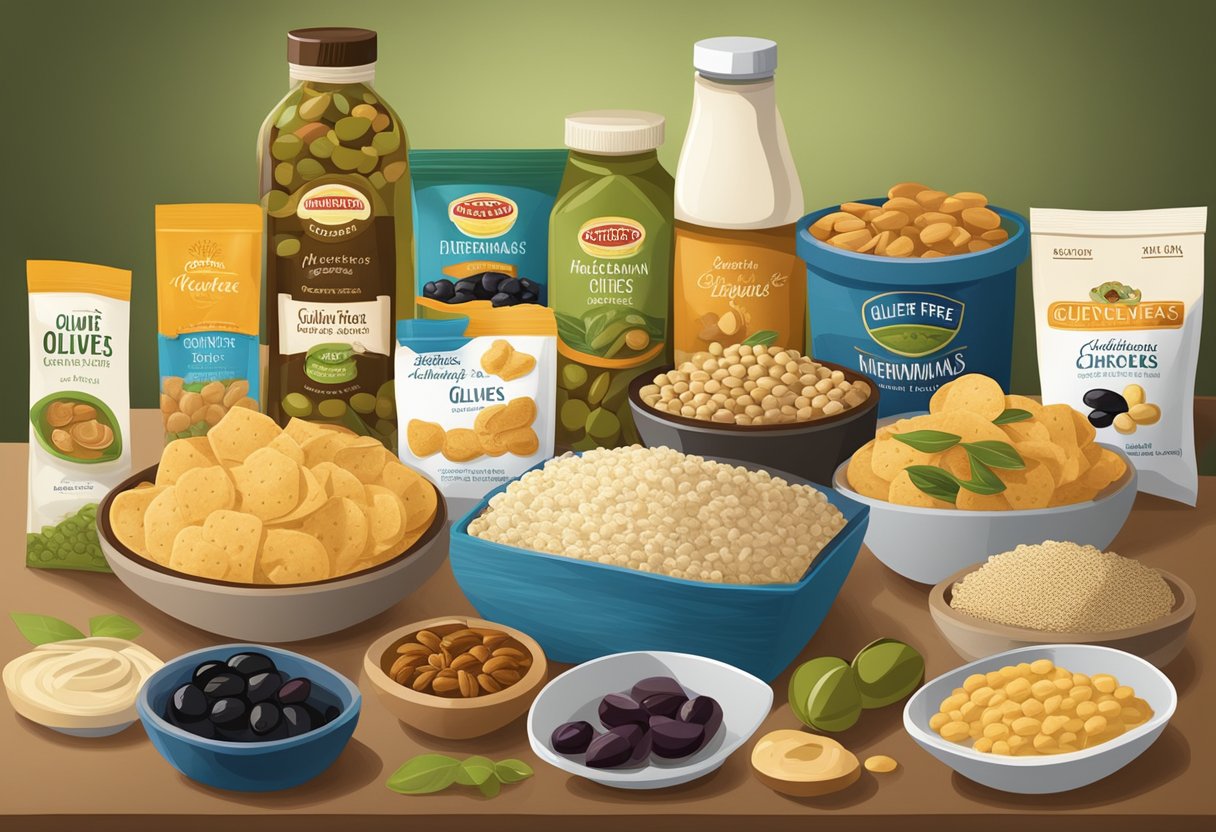
As more people turn towards a gluten-free Mediterranean diet for health and lifestyle reasons, the food industry has responded by providing a wider range of products that cater to these requirements. This shift makes it easier than ever to find snacks that fit within the dietary guidelines, without giving up the convenience of pre-packaged foods. However, it is still crucial to prioritize whole foods and ingredients native to the Mediterranean region—fruits, vegetables, lean proteins, healthy fats, and gluten-free grains. The key is to balance nutrition with convenience, making smart choices that align with both gluten-free and Mediterranean dietary principles.
Key Takeaways
- A gluten-free Mediterranean diet blends the benefits of both diets while allowing for convenient snacking options.
- Careful reading of nutrition labels is necessary to ensure snacks are truly gluten-free and adhere to Mediterranean dietary principles.
- Prioritizing whole foods and natural ingredients is essential for maintaining the health benefits of a gluten-free Mediterranean lifestyle.
Table of Contents
Understanding Gluten and Celiac Disease
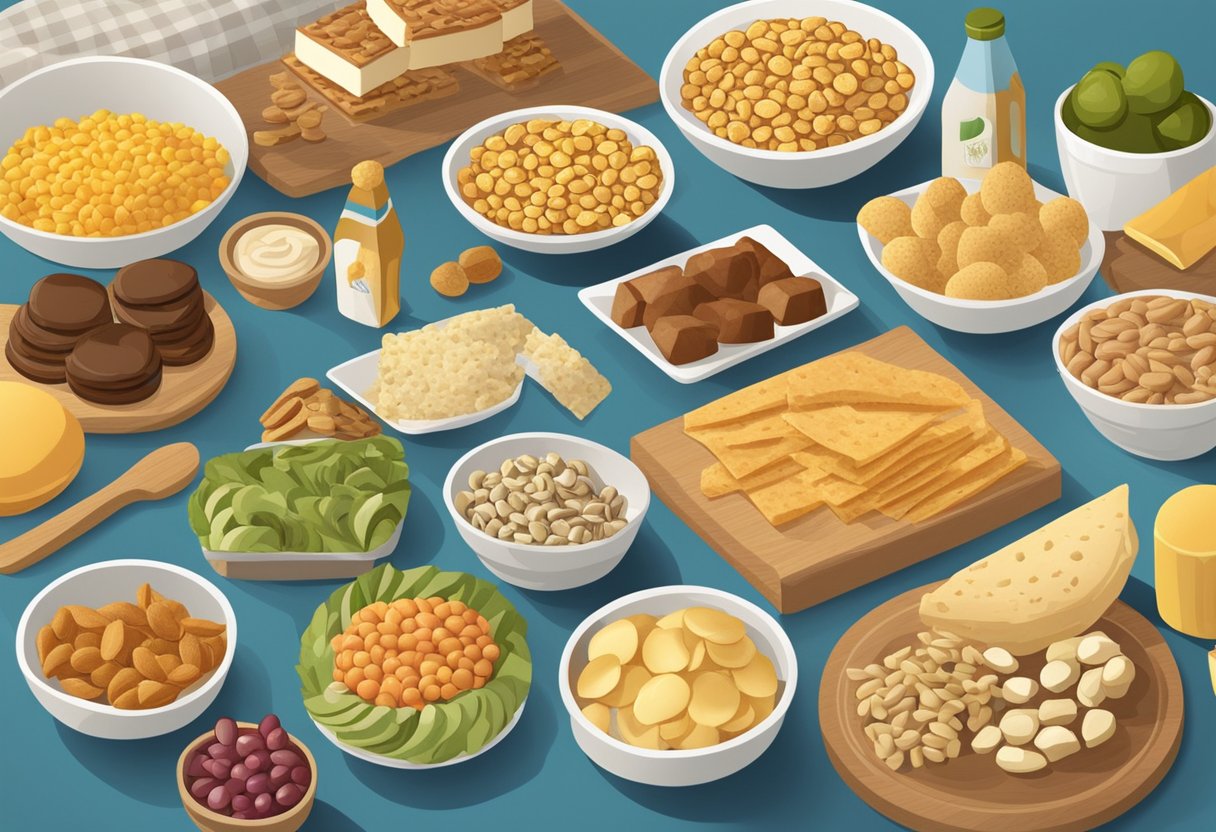
Gluten is a protein predominantly found in grains such as wheat, barley, and rye. For most people, consuming gluten is harmless, but for those with celiac disease, ingestion can lead to damaging immune responses.
Celiac disease is an autoimmune disorder where the ingestion of gluten leads to damage in the small intestine. When individuals with celiac disease consume gluten, their immune system responds by attacking the small intestine’s lining, which can interfere with nutrient absorption.
Key points about celiac disease and gluten:
- Celiac Disease Prevalence: It affects approximately 1% of the population globally.
- Symptoms: They can range from gastrointestinal discomfort to non-GI disturbances, including anemia and fatigue.
- Diagnosis: Celiac disease is diagnosed through blood tests and biopsies of the small intestine, with medical guidance crucial for proper management.
For those adhering to a Mediterranean diet, which emphasizes fruits, vegetables, fish, and whole grains, maintaining a gluten-free approach is viable. Substituting traditional gluten-containing grains with gluten-free options like quinoa, buckwheat, and millet can provide similar health benefits without triggering celiac disease symptoms.
People on a gluten-free Mediterranean diet should scrutinize packaged snacks for hidden gluten sources, as cross-contamination or processing practices may introduce gluten. According to the FDA guidelines supported by the Celiac Disease Foundation, products labeled gluten-free must contain less than 20 parts per million (ppm) of gluten, which is a safe threshold for most individuals with celiac disease.
A gluten-free Mediterranean diet can be nutritious and full of variety, provided that careful attention is given to food labels and gluten-free alternatives.
Basics of Mediterranean Diet
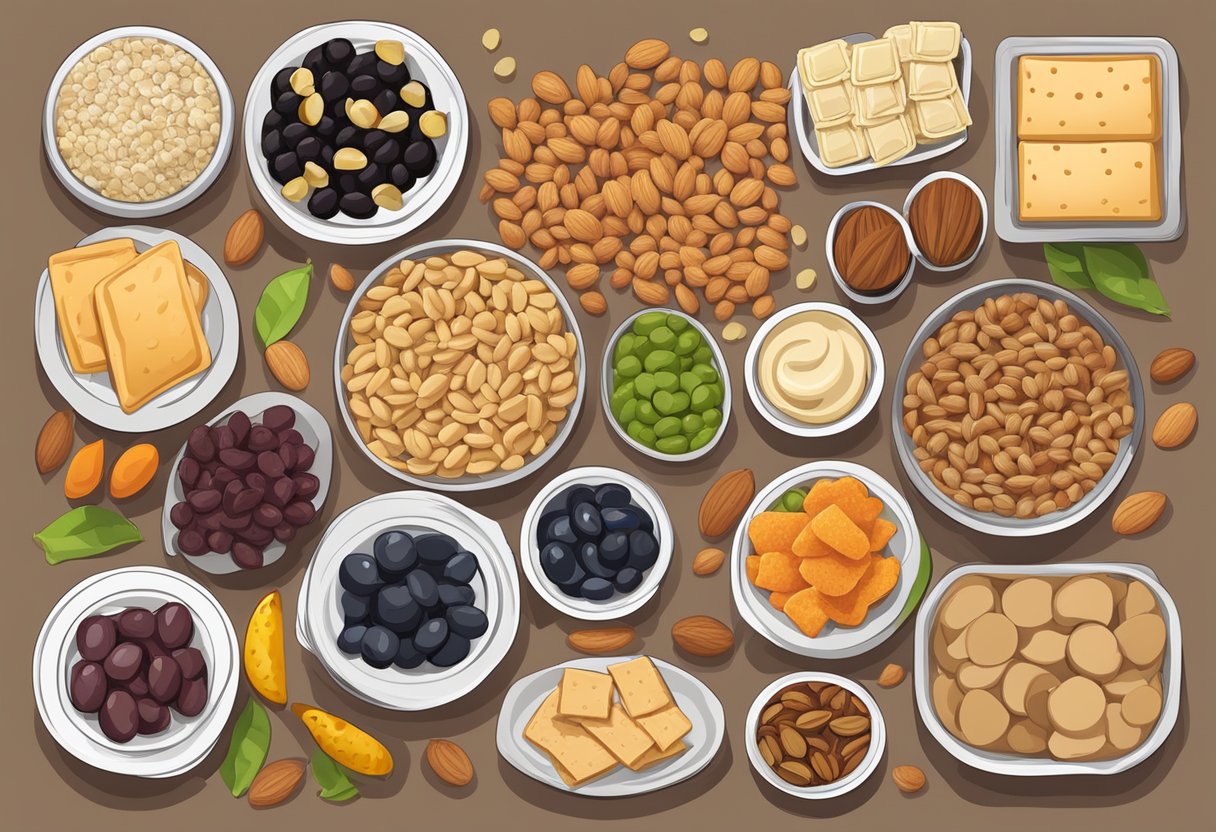
The Mediterranean Diet focuses on plant-based foods, heart-healthy fats, and lean proteins. It is recognized for its potential to improve well-being and decrease the risk of certain chronic diseases.
Key Components
- Healthy Fats: Mainly from sources like olive oil, which is rich in monounsaturated fats and omega-3 fatty acids, essential for heart health.
- Fruits and Vegetables: A diverse array, providing fiber, vitamins, and antioxidants.
- Whole Grains: These are gluten-free options, such as quinoa or buckwheat, that bring essential fiber and nutrients to the diet.
- Nuts and Seeds: A source of healthy fats, protein, and fiber; consumption should be moderate due to high-calorie content.
- Legumes: Including beans and lentils, they are nutritious staples that provide plant-based proteins and fiber.
- Fish: Especially those rich in omega-3 fatty acids, are recommended for their anti-inflammatory properties.
Legumes, nuts, seeds, and wholesome fats should regularly feature in meals while one should limit processed foods and refined grains, parts of a balanced Mediterranean diet regimen.
Health Benefits
- Reduced Risk of Chronic Diseases: Adherence to the diet is associated with a lower incidence of heart disease, stroke, cancer, and other chronic conditions.
- Weight Loss and Brain Health: Studies suggest this diet aids in weight management and supports cognitive health.
The diet’s rich content of fiber, antioxidants, and omega-3 fatty acids is believed to contribute to these health benefits, further emphasizing its role in promoting longevity and disease prevention.
Gluten-Free Diet Essentials
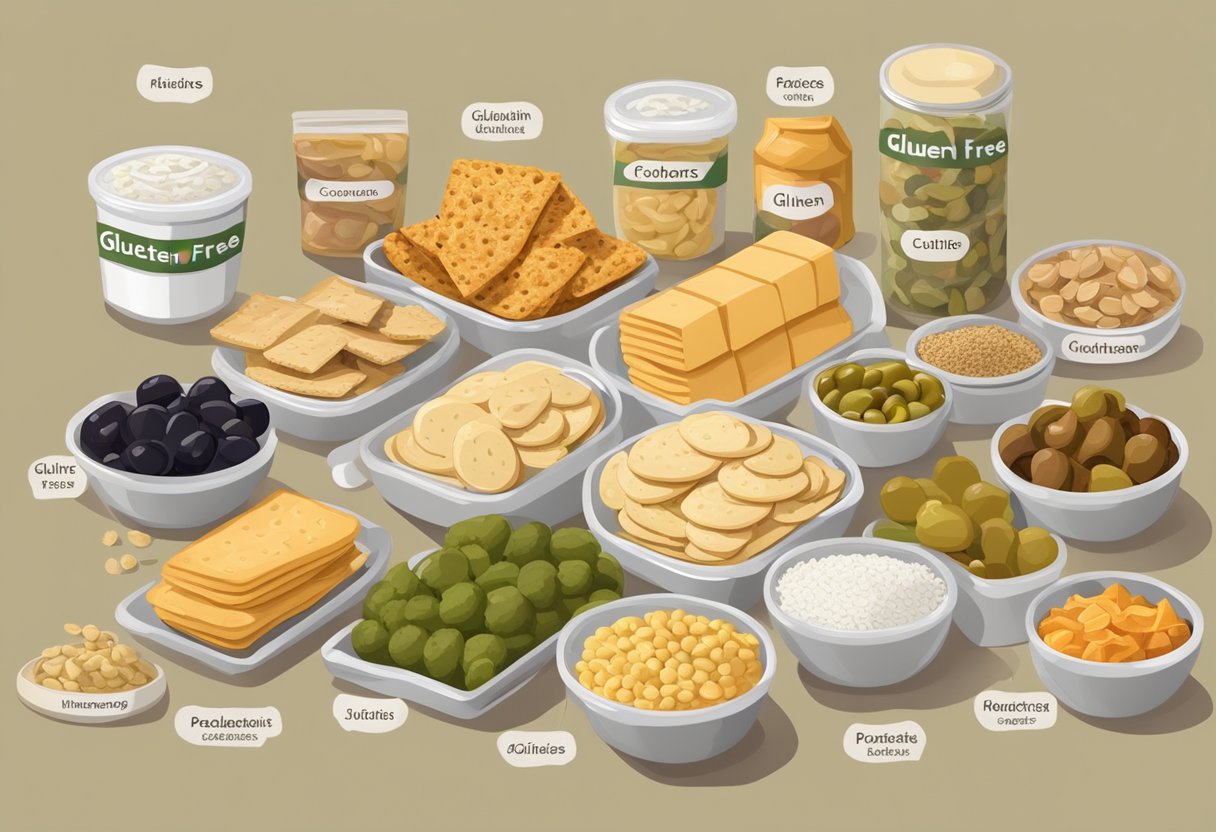
Adopting a gluten-free diet can be a valuable approach to eating, especially for those with gluten sensitivities or celiac disease. When combined with the health-oriented principles of the Mediterranean diet that emphasizes whole foods and healthy fats, it becomes a nutritional strategy that supports overall well-being.
Foods to Include
Whole Foods: Whole foods are integral to any diet focusing on health. They include:
- Fruits and Veggies: A variety of colorful fruits and vegetables are cornerstone to the Mediterranean diet.
- Proteins: Lean proteins such as fish, poultry, eggs, and seafood provide essential amino acids.
- Nuts and Seeds: Include a variety of nuts and seeds, which deliver healthy fats and proteins.
- Legumes: Beans, lentils, and chickpeas offer fiber, protein, and key minerals.
- Dairy: Incorporate dairy products like Greek yogurt, which is rich in probiotics and protein.
- Grains: Safe gluten-free options include rice, quinoa, and buckwheat.
Note: Always double-check the ingredient label to ensure products are truly gluten-free.
Foods to Avoid
Individuals should avoid anything containing wheat, barley, or rye. This includes many conventional packaged snacks and convenience foods. Key items to be avoided:
- Breads and Pastries: Unless specifically labeled gluten-free.
- Processed Meats: Which can have fillers or seasonings containing gluten.
- Pre-packaged Meals: Many contain sauces or gravies that are not gluten-free.
- Condiments and Sauces: Always read labels as they might contain hidden gluten.
By adhering to these guidelines, one can maintain a diverse and flavorful gluten-free Mediterranean diet, benefiting from its rich array of whole foods and nutrient-dense ingredients.
Planning Gluten-Free Meals

When embarking on a gluten-free Mediterranean diet, it’s important to focus on meals that are rich in fruits, vegetables, lean proteins, and gluten-free grains. Planning ahead is crucial to ensure a varied and enjoyable menu.
Breakfast Options
For breakfast, those on a gluten-free Mediterranean diet can start their day with a bowl of gluten-free oats mixed with a generous helping of berries and nuts for added nutrition and flavor. Another option is yogurt topped with gluten-free granola and a drizzle of almond butter; this combination provides a balance of protein, fats, and fiber.
Lunch Ideas
Lunch could include a fresh salad with an assortment of greens, veggies, and a portion of quinoa for a boost of protein and nutrients. Additionally, hummus serves as a great dip or spread for accompanying gluten-free crackers or vegetable sticks, aligning with the Mediterranean diet’s emphasis on legumes and healthy fats.
Dinner Selections
For dinner, a plate comprised of lean proteins such as grilled chicken or fish, a side of roasted veggies, and a serving of gluten-free grains like brown rice or millet will complete the day’s meal plan. These elements come together to offer a satisfying and nutritionally complete end to the day.
Healthy Snacking on a Gluten-Free Mediterranean Diet
Adopting a gluten-free Mediterranean diet emphasizes the consumption of whole, unprocessed foods. Healthy snacking is integral and can be both nutritious and satisfying by choosing the right ingredients.
Nuts and Seeds
Nuts and seeds are a go-to snack for their convenience and nutritional benefits. Almonds, chia, sunflower, and sesame seeds are gluten-free options and are excellent sources of healthy fats. They also provide a good amount of protein, fiber, and essential nutrients like magnesium and vitamin E. A handful can help maintain energy levels between meals.
Fruit and Vegetable Snacks
Fruits and vegetables are cornerstones of the Mediterranean diet, offering a range of vitamins, minerals, and antioxidants. They can be enjoyed fresh or as part of a gluten-free recipe. Snack ideas include apple slices with almond butter or carrot sticks dipped in hummus. Always choose fresh produce to avoid hidden gluten present in some processed foods.
Dairy and Plant-Based Protein
Dairy options such as Greek yogurt and a variety of cheeses are permissible on a gluten-free Mediterranean diet in moderation. They provide a rich source of calcium and protein. For plant-based proteins, consider snacking on legume-based products like hummus or gluten-free roasted chickpeas, which are flavorful and filling.
Homemade Snack Recipes
For those who enjoy preparing their snacks, homemade gluten-free recipes can be a fun and healthy way to indulge. Create your trail mix using gluten-free oats, nuts, seeds, and dried fruits. To satisfy a sweet tooth, blend dates with almonds and coconut for a quick energy bite. Being in control of the ingredients ensures your snacks are free from gluten and added sugars.
Nutritional Considerations and Substitutions
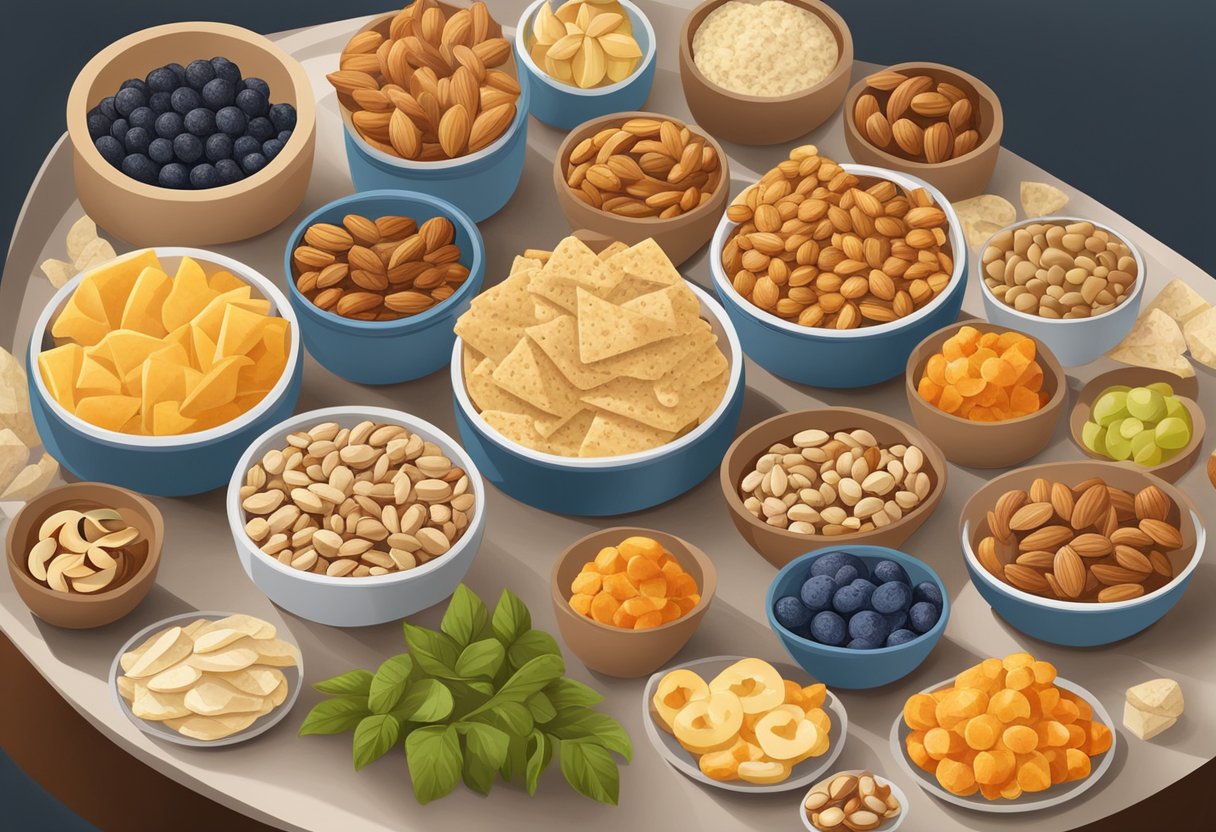
When incorporating packaged snacks and convenience foods into a gluten-free Mediterranean diet, it is crucial to scrutinize nutrition labels for a balance of nutrients. Ideal choices are rich in fiber, low in added sugar, and contain adequate protein.
- Fiber: Opt for snacks with natural fiber sources like nuts or chickpeas.
- Sugar: Seek snacks with minimal added sugars to maintain a healthy eating pattern.
- Protein: Almonds and other nut-based snacks offer a good protein boost.
When replacing whole grains, look towards grain alternatives such as quinoa or buckwheat, which are inherently gluten-free and maintain the fiber content critical to the diet. A Mediterranean diet emphasizes healthy fats, encouraging the choice of snacks with olive oil or seeds.
For dairy substitutes, foods such as almond milk yogurt can provide a similar texture without lactose and maintaining the diet’s preference for plant-based products.
| Gluten-Free Substitute | Mediterranean Diet Benefit |
|---|---|
| Quinoa | High in protein and fiber |
| Buckwheat | Good source of antioxidants |
| Almond milk | Low in calories, dairy-free |
Selecting convenience foods that align with a Mediterranean dietary pattern requires attention to their contents and nutritional value. This approach ensures that individuals not only follow a strict gluten-free regimen but also derive maximum health benefits associated with healthy eating practices.
Shopping and Reading Labels

When embarking on a gluten-free Mediterranean diet, one’s shopping list should prioritize nutrient-dense foods that align with the diet’s focus on fruits, vegetables, lean proteins, and healthy fats. Upon reaching the aisles, it’s essential to meticulously examine ingredient labels for hidden sources of gluten.
Ingredient Label Inspection: Gluten can lurk in unsuspecting places. Even products that seem inherently gluten-free may have been processed in a facility with gluten-containing foods. Ingredients such as barley, rye, malt, and sometimes oats, need careful scrutiny unless they are explicitly labeled gluten-free.
- Gluten-Free Certification: Look for products with a gluten-free certification or label approved by a registered dietitian. These labels guarantee the absence of gluten below standardized thresholds.
- Organic and Processed Foods: Organic does not automatically mean gluten-free. Similarly, processed foods can contain gluten as a binder. Opt for whole, unprocessed foods or certified gluten-free convenience options when possible.
Sourcing Nutrient-Dense Options: Choose whole-food options like quinoa, fresh produce, and lean meats. Read labels to confirm they are devoid of gluten and align with the Mediterranean dietary pattern.
The following table offers guidance on selecting suitable foods:
| Food Category | Choose | Avoid |
|---|---|---|
| Fruits | Fresh, organic fruits whenever possible | Prepackaged fruit snacks with added gluten-containing ingredients |
| Vegetables | Varied, organic vegetables | Pre-made salads with gluten-containing dressings |
| Proteins | Fish, poultry, legumes labeled gluten-free | Processed meats with gluten fillers |
| Fats | Extra virgin olive oil, avocados, nuts, and seeds | Processed snacks not labeled gluten-free |
In summary, vigilance in reading labels is paramount when shopping for a gluten-free Mediterranean diet. One should look beyond the gluten-free claim and evaluate the overall nutritional profile of packaged snacks and convenience foods, choosing options that contribute to a balanced, healthful diet.
Lifestyle and Dietary Adjustments

Adopting a gluten-free Mediterranean diet entails specific lifestyle and dietary adjustments for maintaining a balanced and healthy eating plan. Focusing on healthy fats, individuals should prioritize sources like olive oil while diminishing the intake of red meat and processed foods.
Herbs and spices take center stage, enhancing flavor without the need for gluten-containing additives, allowing for diverse and vibrant meals. Individuals may incorporate a range of fresh and dried options to season their dishes.
Hydration is vital, and one should favor water as the primary source. The role of alcohol is limited, generally to moderate consumption of wine, in alignment with traditional Mediterranean practices.
When it comes to sweets, they are to be consumed sparingly. Fruits often serve as the dessert of choice, aligning with healthy eating principles intrinsic to the diet.
One can adapt the gluten-free Mediterranean diet to cater to vegan preferences, utilizing plant-based proteins in lieu of poultry and seafood. It’s crucial to ensure that packaged snacks and convenience foods meet the gluten-free criteria, checking labels for hidden sources of gluten.
In summary, individuals should:
- Opt for olive oil as the main fat
- Embrace a variety of herbs and spices
- Hydrate predominantly with water
- Limit alcohol and sweets
- Consider plant-based alternatives for a vegan adaptation
Each adjustment not only supports a gluten-free diet but also fosters a sustainable and health-conscious lifestyle.
Health Benefits Beyond Celiac Management
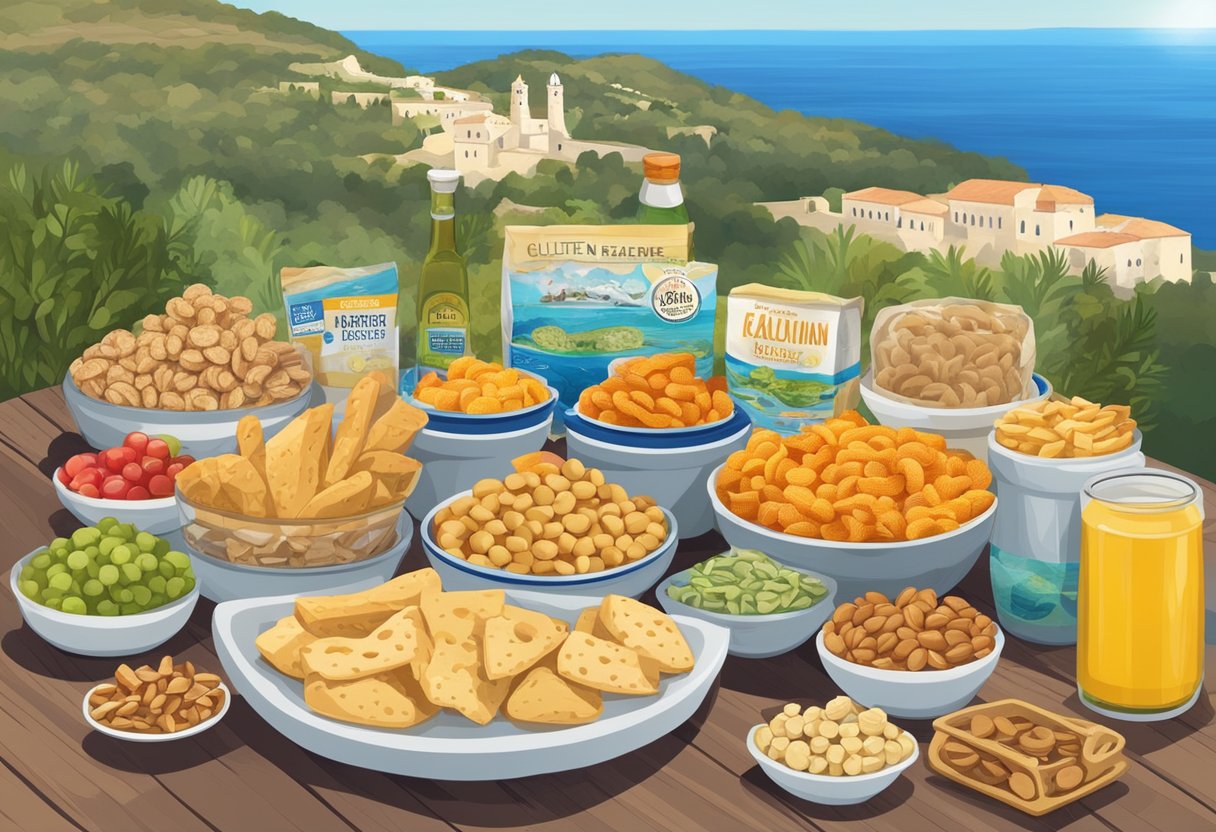
Adopting a gluten-free Mediterranean diet not only assists individuals with celiac disease but can also confer benefits for managing and preventing chronic diseases. This dietary pattern emphasizes consumption of whole foods, such as fruits, vegetables, legumes, and nuts, which are rich in nutrients and antioxidants. These components have been associated with a reduced risk of heart disease and certain types of cancer due to their capacity to mitigate inflammation.
The inclusion of olive oil as a primary fat source, along with a high intake of fiber from plant-based foods, contributes to improved gut health. A healthy gut microbiome plays an essential role in overall wellness, potentially reducing the inflammatory processes linked to various chronic conditions.
Cognitive health is another area where a gluten-free Mediterranean diet shows promise. The diet’s nutrient-dense profile supports brain function and may lower the risk of developing Alzheimer’s disease and other cognitive impairments. Omega-3 fatty acids, found in fish, a staple in the Mediterranean diet, are particularly beneficial for maintaining neuron integrity and function.
Key Nutrients and Their Effects:
- Omega-3 Fatty Acids: Support brain health and may reduce the risk of Alzheimer’s.
- Antioxidants: Found in fruits and vegetables, protect cells from damage, potentially lowering cancer risk.
- Fiber: Promotes a healthy gut, aiding in digestion and inflammation reduction.
While more research is needed to confirm these benefits for those without celiac disease, a gluten-free Mediterranean diet offers a holistic approach to food that supports long-term health and well-being.
Frequently Asked Questions

Navigating a gluten-free Mediterranean diet can be straightforward once you know which snacks and convenience foods fit the bill. These FAQs focus on selecting the right items to maintain a heart-healthy and gluten-free regimen.
What are some gluten-free snack options that align with the Mediterranean diet?
Individuals can enjoy snacks like fresh fruits, nuts, seeds, and olive oil-drizzled vegetables. These options are naturally gluten-free and embody the essence of the Mediterranean dietary pattern.
How can I incorporate convenience foods into a gluten-free Mediterranean diet without compromising heart health?
They can select convenience foods low in saturated fats and free from trans fats, such as pre-cut vegetables or ready-made gluten-free quinoa salads. Checking labels for heart-healthy ingredients is crucial.
Which types of gluten-free crackers are considered suitable for a Mediterranean diet?
Gluten-free crackers made from almond flour or seed-based ingredients support a Mediterranean diet well. These should be free from artificial additives and high in fiber.
Can you recommend any store-bought snacks that fit within the gluten-free Mediterranean diet guidelines?
Yes, there are store-bought snacks such as roasted chickpeas, rice cakes topped with avocado, and dried fruit without added sugar that are suitable options.
Are there gluten-free protein bars that adhere to Mediterranean diet principles?
A protein bar is fitting if it contains nuts, seeds, and has no artificial sweeteners. Ones with added plant-based proteins are also appropriate.
What gluten-free dessert options are compatible with the Mediterranean diet?
Desserts like fruit salads, honey-sweetened yogurt, and dark chocolate that are gluten-free marry well with the Mediterranean diet’s focus on natural sweetness and simple ingredients.



